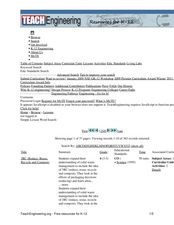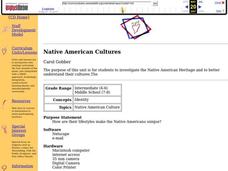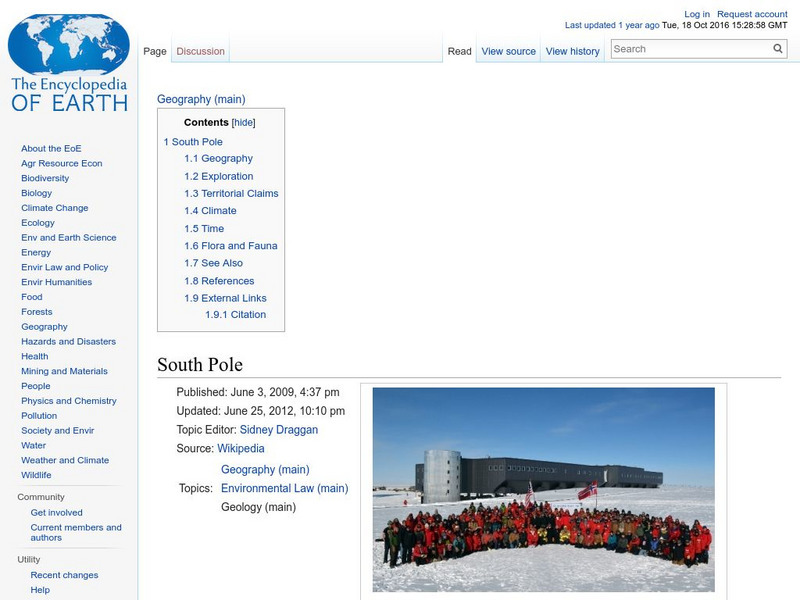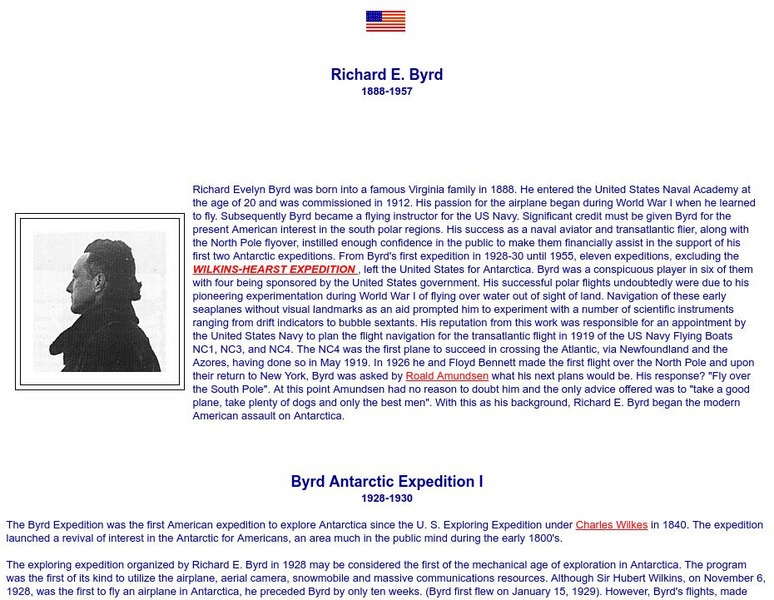Curated OER
Using Magnetotactic Bacteria to Study Natural Selection
Young scholars demonstrate that living organisms may possess incredible adaptations which enable them to survive. They observe bacteria that are able to orient themselves using the Earth's magnetic field and formulate a hypothesis as to...
Curated OER
Globe Lesson 4 - The Compass
Learners study compass' and their use in navigation. In this compass lesson, students use a compass and a globe to answer the questions about navigation.
Curated OER
Bean and Ozone Project
Young scholars performed an experiment in which they grew beans in an ozone chamber and some in regular air in order to see if the ozone causes damage to the plants.
Curated OER
Ka Iwikuamo'o
In this foreign language worksheet, students find the words that are related to the acquisition of new vocabulary. The answers are found at the bottom of the page.
Curated OER
Thar She Blows
Students discover the effects of El Nino on the global climate. As a class, they role play the role of a cold or warm wind and act out a skit in front of the class. They discuss the results of the role play once it is completed.
Curated OER
How Does Temperature Change With Respect To Latitude and Longitude?
Students research the concept of predicting the weather. The research focuses on how some weather facts intuitively make sense. Students answer key questions based upon the mathematical concept of covariance.
Curated OER
Immigration in the Connecticut River Valley
Students discuss and compare immigration during the 18th century to the Connecticut River Valley to that in America during the turn of the century.
Curated OER
Heritage: What A Sight!
Fifth graders examine the landmarks along the Pioneer Trail. They discover these landmarks were used as guides. They research the Pioneer Trail and present to the class.
Curated OER
Animals in Japan
Pupils compare and contrast common animals children love and have as pets in Japan and America in this early elementary lesson. The culminating project is an original work of art by each student depicting an animal of their choice.
Curated OER
Native American Cultures
Students investigate the Native American Heritage and explore their customs cultures. They discover characteristics of the Native Americans through the study of their art, artifacts, stories and symbols.
Curated OER
Forecasting Weather
In this weather instructional activity, students review the different things a meteorologist studies and how they collect weather data. Students compare weather watch and weather warning. This instructional activity has 10 matching and 3...
Curated OER
Oceans
In this oceans worksheet, student use clues from a song titled "Oceans," then locate and label the 5 oceans. An answer key is given but page doesn't included a song link.
National Science Foundation
National Science Foundation: u.s. South Pole Station
The resource explores the National Science Foundation's Amundsen-Scott South Pole Station. The interactive activity consists of a video tour, illustrations, related resources, and a webcam.
CNN
Cnn: Buzz Aldrin Evacuated From South Pole
Buzz Aldrin, a former astronaut who walked on the moon, was evacuated from the South Pole after his medical condition deteriorated, according to a release.
Other
South Pole: Roald Amundsen
This site is on Amundsen (1872-1928 CE), the leader of a Norwegian expedition, races Robert Scott's group to the South Pole.
Encyclopedia of Earth
Encyclopedia of Earth: Geography: South Pole
Information about the Geographic South Pole. Explains how it is defined, the marker (which must be adjusted each year due to ice movements) that identifies its location, and 'other' South Poles, i.e., the Ceremonial South Pole and the...
The Newberry Library
Newberry Library: Art and Exploration of the Poles
Resource with lesson and primary source documents examines the connections between exploration of the North and South Poles and their visual representation.
TED Talks
Ted: Ted Ed: The Dangerous Race for the South Pole
After two Americans staked claim to reaching the North Pole, a Norwegian explorer and a British naval officer each set out for the last unmapped region in what newspapers called a "Race to the Pole." Elizabeth Leane sets the scene for...
Australian Broadcasting Corporation
Australian Broadcasting Corporation: News in Science: Double Eye Vortex at Venus' South Pole
From ABC News in Science, this article explores findings related to the "double-eye vortex" discovered hovering above Venus' south pole.
Other
South Pole: Richard E. Byrd (1888 1957)
This article profiles Admiral Richard E. Byrd (1888-1957), the American naval officer and Antarctic explorer.
NASA
Nasa: Climate Kids: Polar Temperatures
What is it that maske the North and South Pole so different? Find out here when you learn about the climates of the poles
American Museum of Natural History
American Museum of Natural History: Race to the End of the Earth
Multimedia-rich exhibition documents the race, in 1911, to be the first to reach the South Pole. Two teams undertook the perilous journey, one British, led by Robert Scott, and one Norwegian, led by Roald Amundsen. With digital dioramas,...
Royal Geographical Society
Royal Geographical Society: Antarctica: Extreme Wilderness
Information, activities and images of Antarctica including a number from Scott's expedition to the South Pole.
Smithsonian Institution
National Museum of Natural History: Ocean Portal: Life at the Poles
The poles of the earth are often grouped together, however, they are very different. This article is a companion to the exhibit at the Smithsonian. You will learn about adaptations that organisms must make and ways that we affect the...
























